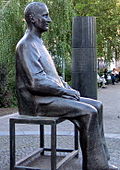- The Resistible Rise of Arturo Ui
-
The Resistible Rise of Arturo Ui (original German title: Der aufhaltsame Aufstieg des Arturo Ui) is a play by the German dramatist Bertolt Brecht, originally written in 1941. It chronicles the rise of Arturo Ui, a fictional 1930s Chicago mobster, and his attempts to control the cauliflower racket by ruthlessly disposing of the opposition.
Contents
Background
It was written by Brecht in only three weeks in 1941 whilst in exile in Helsinki, Finland awaiting a visa to enter the US. The play was not produced on the stage until as late as 1958, and not until 1961 in English. In spite of this, Brecht never envisioned a version of the play in Germany, intending it for the American stage all along.
The play is consciously a highly satirical allegory of Adolf Hitler in Nazi Germany, whose rise Brecht represented in parallel to that of Ui. All the characters and groups in the play had direct counterparts in real life, with Ui representing Hitler, his henchman Ernesto Roma representing Ernst Röhm, Dogsborough representing Paul von Hindenburg (a pun on the German Hund and Burg), Emanuele Giri representing Hermann Göring, the Cauliflower Trust representing the Prussian Junkers, the fate of the town of Cicero standing for the Anschluss in Austria and so on. In addition, every scene in the play is based on a real event, for example the warehouse fire which represented the fire at the Reichstag, or the Dock Aid Scandal which represented the Osthilfeskandal (East Aid) scandal. The play is similar to the film The Great Dictator (1940), which also featured an absurd parody of Hitler by Charlie Chaplin.
Dramatically it is in keeping with Brecht's Epic style of theatre. It opens with a prologue written in the form of a direct address to the audience outlining all the major characters and explaining the basis of the upcoming plot, allowing the audience to better focus on the message than the suspense of what may happen next. It also describes in its stage directions the prominence that technical aspects of theatre should play in a production, most notably in the use of signs or projections appearing after certain scenes which present the audience with relevant information about Hitler's own rise to power, in order to clarify the parallels. The play also uses frequent references to Shakespeare and other writers to further its didactic messages. To highlight his evil and villainous rise to power, Ui is compared to Shakespeare's Richard III and Macbeth in both the introductory prologue and in scene 14 when he experiences similar visitations from the ghosts of his victims as Richard and Macbeth do; while Hitler's own learned prowess at public speaking is referenced by Ui receiving lessons from an actor which include him reciting Mark Antony's famous speech from Julius Caesar.
Productions
The part of Arturo Ui has been played by a number of notable actors including Al Pacino, Darryl Low, Leonard Rossiter, Antony Sher, Nicol Williamson, Griff Rhys Jones and Peter Falk. Simon Callow discusses his interpretation of the role in his autobiography, Being an Actor.
A celebrated German production of the play, directed by Heiner Müller has run in repertory at the Berliner Ensemble in Berlin since June 1995, with Martin Wuttke in the title role.
Influences
Lines from the play are quoted at the end of Cross of Iron, a 1977 drama war film directed by Sam Peckinpah:
Do not rejoice in his defeat, you men. For though the world has stood up and stopped the bastard, the bitch that bore him is in heat again.[1]
Herrick, a fictional character from BBC Three's Being Human, quotes the play's epilogue during his final soliloquy:
The world was almost won by such an ape! The nations put him where his kind belong. But do not rejoice too soon at your escape — The womb he crawled from is still going strong.
Characters
- Dogsborough → Paul von Hindenburg
- Arturo Ui → Adolf Hitler
- Giri → Hermann Göring
- Roma → Ernst Röhm
- Givola → Joseph Goebbels
- Dullfeet → Engelbert Dollfuß
- Karfioltrust → Junker, the Industrial trust
- Gangster → Faschisten
- Fish → Marinus van der Lubbe
The different places cited in the text:
- Chicago → Germany
- Cicero → Austria
- Dockshilfeskandal → East Aid Scandal
See also
References
- ^ Bertolt Brecht – The Resistible Rise of Arturo Ui. source Blockbuster Online - Cross of Iron
Categories:- Anti-fascist plays
- Plays by Bertold Brecht
- Plays and musicals based on Shakespeare plays
- Organized crime fiction
- Al Capone
- 1941 plays
- Satirical plays
- World War II plays
Wikimedia Foundation. 2010.

